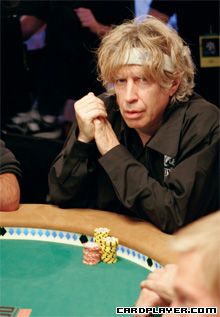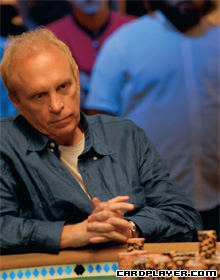"When you say 'Dylan,' he thinks you're talking about Dylan Thomas, whoever he was."
Today's music quote comes from Paul Simon's brilliant (even after 40 years) song,
A Simple Desultory Phillipic. He's poking fun at a generation (his) of youngsters who know only their own contemporary heroes. Simon notes that his peers discuss "Dylan" as if there's only one - the singer Bob - but have never heard of legendary Welsh writer Dylan Thomas.

I worry sometimes that today's poker players, and particularly the young ones, don't know or study the people who forged the game as we know it, 20-30 years ago. I got to thinking about it recently when I was at the
European Poker Tour event in Copenhagen. I was helping the TV production people go over the list of players, looking for camera-worthy notable names. The production manager, a bright young woman, but relatively new to poker, was understandably looking for the names she recognized from previous
EPT events. She skipped right over "T.J. Cloutier."
"Um, you probably want to get some footage of him."
"Is he famous?"
"Well, if he wore all of his
World Series of Poker bracelets on his right arm, he'd list to starboard. But for a three-outer 9 in 2000, he'd probably have another one - for the main event. And he's one of the old-time Texas road gamblers; there's not too many of 'em left, and fewer still playing actively."
She chuckled. "I knew there was a reason we have you around."

I'm delighted to report that when Tournament Director Thomas Kremser announced T.J.'s presence in the tournament, the room erupted in loud applause; clearly, a lot of players knew that they were playing with one of the greats. When Thomas made his announcement, a fellow standing next to me said, "Wow - it's like having Phil Ivey or Daniel Negreanu here."
"Yeah," I replied, "but I don't know if Phil or Daniel has ever been robbed at gunpoint in a poker game."
Later during one of the tournament breaks, a participant commented to me, "I just got moved away from T.J.'s table. It'll be good for my results - I'll do a better job of concentrating on the game - but I was sure enjoying the jokes and stories." I wasn't surprised to hear that T.J. was a gentleman throughout the event, signing autographs and commenting graciously how much he was enjoying Danish hospitality. He even went very deep in the tournament, finishing in the teens.
But this isn't a homage to T.J. Cloutier as much as it's a suggestion that you learn about him and the players of his generation. As I told the
EPT TV production manager, there aren't a lot of those guys left. They harken back to a time when poker was mostly all-white, mostly all-male. The game was spoken with an accent from Dallas, Amarillo, or Houston - well, and occasionally Greenwich Village, Jones Beach, and the Bronx. There are a few of those guys still around besides T.J.: Perry Green, Carl McKelvey, Chip Reese, and Mickey Appelman - and, of course, the godfather of the modern game of poker, Doyle Brunson.

If you find yourself at a poker table with one of those guys, buy him a cup of coffee during the break. Don't bother asking if you played a hand correctly or how to handle A-Q from under the gun - partially because that sort of tutorial is rarely useful (Miles Davis famously commented, "If you could understand everything I was doing, you'd be me"), but mostly because you'll miss your opportunity to hear a story. If you can get one of the old-timers to tell you a story of poker in the '70s or '80s, you'll remember that tale long after you've spent the cash you win in the event.
Now, lest you get the wrong idea, I hold no romantic notions about what the world of poker was like all those years ago. I was there during the late '80s; I remember the low ceilings at Binion's and smoke so thick that you couldn't see across the room. Drugs were an important part of the scene, and took some of the best players of that time: Jack Straus, Bones Berland, and, of course, Stu Ungar. There was little glamour, no TV sponsorship, and definitely no beer or pharmaceutical logos on the
WSOP felts. And again, it was virtually all-white and all-male.

I consider myself fortunate to be part of the "new" poker world, where the modern champions are regarded as rock stars, smoking is virtually gone, and the players a bouillabaisse of age and ethnicity. Women continue to increase their representation in major tournaments, and every poker aficionado knows names such as Jennifer Harman, Cyndy Violette, and Annie Duke. The final two players at this year's
PokerStars Caribbean Adventure are both college students, and the winner is pursuing a graduate degree in math. It's the younger, more diverse, more affluent world of poker, and it's wonderful. But let's not forget where it all started and the people who were there for the beginning.
If you want to study up on your poker history, I suggest two books to get you started:
Biggest Game in Town by Al Alvarez, and
Big Deal by Anthony Holden. Both are back in print, thanks to the recent wave of poker popularity (a not-insignificant benefit thereof). If you love poker, these are must-reads; they beautifully capture the time and players who forged the game as we know it today. And when you're at a table with T.J., ask him, "Why did they call ace-king 'Walking back to Houston'?"
"The man ain't got no culture."  Lee Jones is the poker room manager for PokerStars.com, and the author of the best-selling book Winning Low Limit Hold'em.
Lee Jones is the poker room manager for PokerStars.com, and the author of the best-selling book Winning Low Limit Hold'em.







 I worry sometimes that today's poker players, and particularly the young ones, don't know or study the people who forged the game as we know it, 20-30 years ago. I got to thinking about it recently when I was at the European Poker Tour event in Copenhagen. I was helping the TV production people go over the list of players, looking for camera-worthy notable names. The production manager, a bright young woman, but relatively new to poker, was understandably looking for the names she recognized from previous EPT events. She skipped right over "T.J. Cloutier."
I worry sometimes that today's poker players, and particularly the young ones, don't know or study the people who forged the game as we know it, 20-30 years ago. I got to thinking about it recently when I was at the European Poker Tour event in Copenhagen. I was helping the TV production people go over the list of players, looking for camera-worthy notable names. The production manager, a bright young woman, but relatively new to poker, was understandably looking for the names she recognized from previous EPT events. She skipped right over "T.J. Cloutier." I'm delighted to report that when Tournament Director Thomas Kremser announced T.J.'s presence in the tournament, the room erupted in loud applause; clearly, a lot of players knew that they were playing with one of the greats. When Thomas made his announcement, a fellow standing next to me said, "Wow - it's like having Phil Ivey or Daniel Negreanu here."
I'm delighted to report that when Tournament Director Thomas Kremser announced T.J.'s presence in the tournament, the room erupted in loud applause; clearly, a lot of players knew that they were playing with one of the greats. When Thomas made his announcement, a fellow standing next to me said, "Wow - it's like having Phil Ivey or Daniel Negreanu here."
 I consider myself fortunate to be part of the "new" poker world, where the modern champions are regarded as rock stars, smoking is virtually gone, and the players a bouillabaisse of age and ethnicity. Women continue to increase their representation in major tournaments, and every poker aficionado knows names such as Jennifer Harman, Cyndy Violette, and Annie Duke. The final two players at this year's PokerStars Caribbean Adventure are both college students, and the winner is pursuing a graduate degree in math. It's the younger, more diverse, more affluent world of poker, and it's wonderful. But let's not forget where it all started and the people who were there for the beginning.
I consider myself fortunate to be part of the "new" poker world, where the modern champions are regarded as rock stars, smoking is virtually gone, and the players a bouillabaisse of age and ethnicity. Women continue to increase their representation in major tournaments, and every poker aficionado knows names such as Jennifer Harman, Cyndy Violette, and Annie Duke. The final two players at this year's PokerStars Caribbean Adventure are both college students, and the winner is pursuing a graduate degree in math. It's the younger, more diverse, more affluent world of poker, and it's wonderful. But let's not forget where it all started and the people who were there for the beginning.